Graham Reid | | 12 min read
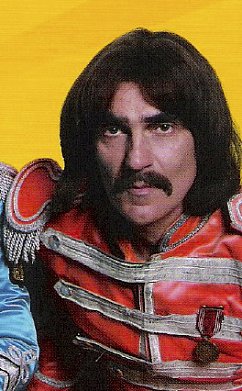
It must have been unnerving for Andre Barreau when, at a party in 1996, he came face-to-face with the man he had been impersonating for a decade and half. He'd earned money off the man's music and image . . . and he is still doing it today.
For the past 32 years Andre Barreau -- now 52 -- has traveled the world playing the part of another man, and for more than 11 years that man has been dead.
Yes, singer-guitarist Barreau has done other things – played lead guitar on Robbie Williams' Angels, written soundtracks, worked with Gary Barlow, appeared on albums by Wreckless Eric and others –but mostly he's sung and played as someone else: the late George Harrison.
After teenage years with the hard-working band Sunsly (“big around Oxford and Swindon, but punk ate us up”) he joined the cast of the London stage show Beatlemania in 1980 and his career as George Beatle began.
After that short career with the other leads he formed the Bootleg Beatles and since 1980 he has traveled the word from Mongolia to India to Russia and across Europe many times as George Harrison.
Today in addition to being Harrison for the duration of their acclaimed performance, Barreau also co-manages the Bootleg Beatles with their former John Lennon, does their artwork and backdrops . . . and has performed before Paul McCartney, the Beatles' producer Sir George Martin and, most unnervingly as he tells us, George Harrison.
It's been a long career as someone else. Your life in music began . . .
I working at the BBC doing programme research but then got out of that and into rock band in Oxford playing seven days a week for two and half years. They were called Sunsly, we had a big following around Oxford and Swindon, but punk came along and ate it all up.
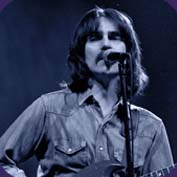 We didn't have any successful records so when Beatlemania came up
I fancied a change so went back to London and auditioned.
We didn't have any successful records so when Beatlemania came up
I fancied a change so went back to London and auditioned.
So how long did that show run?
It was very short, about four months in total and it didn't really catch on. It was a weird time because the Beatles weren't as revered in 79-80 as they are now because all the members were still alive. So there wasn't that feeling of nostalgia so much.
But you started the Bootleg Beatles. In the long time you've been doing Bootleg Beatles you must have observed ups and downs of Beatle popularity.
Yes, it is a barometer. Initially John Lennon was still alive when we started and that had a different feeling. The feeling, in Britain at least, was we had the Beatles and Led Zeppelin and now punk and the New Romantics so what's next? And who needs the past? During the Eighties there was a feeling of 'this is new' but then also 'is this it? Do we need this?'
So by the time we got to the Nineties people like Oasis were saying the Beatles were amazing and there isn't going to be another of those, and that feeling there wouldn't be another Beatles in our lifetime has grown. So it's been a gradual progression to more reverence of the Beatles, although strangely in England some people still don't like the Beatles, which I think is like not liking your elder brother.
But it's grown all the time.
When the Anthology came along there was more interest again in the Bootleg Beatles?
True. But the big event, although it went hand-in-hand with the Anthology, was the release of Free as a Bird. That really pushed up the interest in the Beatles . . . and we were able to play it live.
So you play Free as a Bird?
We're not doing it in the current set but we do it occasionally and I think it's a great song. I'm always a bit disheartened when people think it's rubbish. I think it's fantastic.
Well, it has a wistful quality of loss which seemed appropriate.
There's a lovely chord sequence to it.
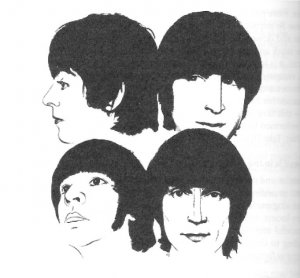 Let's talk about after the Beatlemania show. Did you get together
with the other guys and say that famous line Lennon said about seeing
Elvis: 'that's a good job'?
Let's talk about after the Beatlemania show. Did you get together
with the other guys and say that famous line Lennon said about seeing
Elvis: 'that's a good job'?
[Laughs] It was a bit like that. I was in a band before that and a couple of the others guys had been in a duo and we didn't want to go backwards to that. So that's why me and the John Lennon – who is Neil Harrison, confusingly – asked the other two guys if they wanted to form a Beatle group and they said 'yes'. We thought it would only last six months because we didn't know if there would be any demand for it and it seemed like a good stopgap without having to back to what we were doing before.
How seriously did you take back then?
Really seriously because, as is now the case, we are all mad Beatle fans and the training at the West End was good for us and we wanted to do the music as accurately as possible. You have to bear in mind it was a lot harder then to work out the music because there was just record players. There was no You Tube and you could only see the films at Christmas in the UK, so we had to know our stuff even to just mimic.
Now there is all the sheet music and so on.
Yeah. You couldn't get the guitars or the boots or even just a black polo neck jumper. The only thing that was easy to get was the haircuts. We just grew our fringes. Everything else we had to search for, like the guitars. Now they are all remade as signature reissues because of so many tribute bands, if you want a certain costume someone will sell it to you. Back then we had to get everything made from pictures.
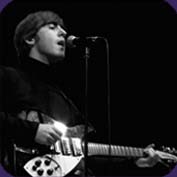 I know there was an early tour of workingmen's clubs around the UK
but in '82 you went to Russia. Was there was more demand for you in
places where the Beatles had never been?
I know there was an early tour of workingmen's clubs around the UK
but in '82 you went to Russia. Was there was more demand for you in
places where the Beatles had never been?
Definitely in the USSR, and we did Israel before that and India before that. So yes, there was a bit of that. But we were doing mainland Europe as well a lot. It wasn't taken very seriously in the UK at first but that was that attitude, 'we've got this band and that band so why do we have to worry about the Beatles?'
Also as a new generation comes along who were not there at the time, for them there's nothing to be nostalgic about but this is just a fascinating part of history. Some of them would be your audience?
We often discuss that and how people have changed over the years. It was a voyage of nostalgia at first but the funny thing was, it wasn't across the board because when we started doing the Bootleg Beatles there were still old people – 55-65 – who hated the Beatles because that wasn't the music of their era.
The idea of being told you have turn your volume down by a granny is impossible now. Because a granny of 72 is the same age as the Beatles themselves now. So first it was nostalgia for people up to the age of 40, then it became this voyage of discovery for these kids who get hooked on the nectar of that sound and the interest in that era in which so much happened in a short period of time.
We end up playing to a mix of people discovering the Beatles and seeing what it would have been like to see them live, and people coming to check us out and see if it sounds like their memory.
 It is a very authentic sound which has become more elaborate over
the years. When you started were you just doing up to about Beatles
For Sale or Rubber Soul?
It is a very authentic sound which has become more elaborate over
the years. When you started were you just doing up to about Beatles
For Sale or Rubber Soul?
We've always tried to the whole of the repertoire as best we we could, but with the Bootleg Beatles we couldn't afford, or couldn't dream, of having any orchestral players. So we used to do up to Paperback Writer and then we'd do Get Back, Come Together and Hey Jude. But we'd also try and do stuff like our version of Got To Get You Into My Life with the guitars doing the [horn] parts. That was in the Eighties.
Once we started in the Nineties going back into concerts in Britain and not just universities, we decided to try and get an orchestra and so we had to learn about miking up. That was really complex 20 years ago, now you can do it well. Sound systems even 20 years were nowhere near as good as now.
[Laughs] We did attempt to do A Day in the Life but God knows what it was like with the keyboard and guitar doing that build-up. I suppose people were amazed we would even try. Now of course we can replicate the actual track.
Now we know what is a good efficient minimum amount of [orchestral] players we can have to replicate that Beatles sound. We didn't really do a Sgt Peppers set until about three years into the Nineties.
Have you observed that some songs come into popularity? Hey Bulldog, for example. No one ever spoke about that until about five years ago and it seemed one that people discovered.
 It's been fascinating. Hey Bulldog, I agree. It's one we did for
years. When we started it was more McCartney-based with Yesterday,
Let It Be and so on. That was where many people thought all the
genius of the Beatles was, but then in the Nineties we started doing
[Lennon's] In My Life and people went, 'Ah what an intelligent song'
and when we did Glastonbury with Oasis we were doing Helter Skelter
and people went, 'What! They are doing heavy metal'.
It's been fascinating. Hey Bulldog, I agree. It's one we did for
years. When we started it was more McCartney-based with Yesterday,
Let It Be and so on. That was where many people thought all the
genius of the Beatles was, but then in the Nineties we started doing
[Lennon's] In My Life and people went, 'Ah what an intelligent song'
and when we did Glastonbury with Oasis we were doing Helter Skelter
and people went, 'What! They are doing heavy metal'.
It's been just fascinating to see the genius of the Beatles and how they dipped their toes into so much different music. So the vogue songs have changed all the time. Funnily enough we did Happiness is a Warm Gun on our last tour and people were saying 'We didn't know the Beatles had invented prog-rock'. It is seamlessly welded together.
After Harrison died did you put more Harrisongs into the show?
Not really, he was always considered the quiet one but he was probably only that up until A Hard Day's Night, but he was the most vocal of all and would stamp his foot. I would do that solo version of While My Guitar Gently Weeps way back in the Nineties, I did it at the Glastonbury Festival.
So I've always advocated his music and that's been a good thing in the Bootleg Beatles, we weren't just a Lennon-McCartney show. We gave him the same kind of airtime he would get on any album, so it hasn't really changed. Although I have noticed that Here Comes the Sun was used on an advert in Britain and it's absolutely become the vogue song of the Beatles at the moment. I think it's the second most downloaded on iTunes after Hey Jude.
The Martin Scorsese documentary about Harrison was very interesting and now that album of his acoustic work which Giles Martin produced . . . and you are blown way by his songwriting ability.
Well, he was in the shadow of the finest songwriters, but he was phenomenal and I love the fact, although it's sad it takes someone's death, that there is that recognition that he was a giant in songwriting.
You are lucky in a sense that just about everything the Beatles did became iconic from playing Shea Stadium and the Budokan to the roof of Apple. You've done all those things too. Do you get a frisson of excitement when in '99 you went on the roof of Apple to replicate that final performance 30 years later?
 Oh yes, and we did it again as an acoustic thing in 2009. For a mad Beatle
fan that was just brilliant having watched the film Let It Be many
times . . . and to see Savile Row and the adjoining streets stopping
just as they did with the same people looking up. I counted how many
venues we've played where the Beatles did and it was something
ridiculous, something like 70 around the world. That's been an
absolute thrill.
Oh yes, and we did it again as an acoustic thing in 2009. For a mad Beatle
fan that was just brilliant having watched the film Let It Be many
times . . . and to see Savile Row and the adjoining streets stopping
just as they did with the same people looking up. I counted how many
venues we've played where the Beatles did and it was something
ridiculous, something like 70 around the world. That's been an
absolute thrill.
You've played in Liverpool?
Yeah, obviously the Cavern has been pulled down and there's a new one and we played there. But we played the Liverpool Empire where they did and there's a place called Port Sunlight, named after Sunlight soap, and that was Ringo's first gig and we played there. There have just been so many weird little gigs they did.
What was the response like in Liverpool. Are they more critical or more appreciative?
They are great actually, as long as I do my Liverpool accent and not my London voice. It was daunting at first but it's been great and we've played there many times.
Speaking of daunting, I understand you have been seen by Paul McCartney, George Harrison and Sir George Martin.
It's true. I think George Harrison was for me the most scary. It was quite a small party we were playing at, it was David Gilmour's 50th birthday a few years back and I'd seen the guest list and thought, 'No, George Harrison will never come'. But he was there and I was really nervous and thought I would just be the best George I can be and honour his George Beatle as much as possible and not be coy or cool. Just do my job. Then we met him afterwards and we spoke to him on and off for about five hours. He was on amazing form.
 Did he give you any tips?
Did he give you any tips?
Funnily enough we mentioned Free as a Bird and our then-bass player made a mistake and George went through the chords for us, it was amazing. He made some great jokes.
He said [Barreau adopts a pitch perfect Harrison voice], ' Whose the Bootleg Brian Epstein? Because he's got all the money'.
And he said to me, 'You probably know the chords better than I do because I only played these songs once, you know, then I forgot them'. He was fantastic and talked about all kinds of things, probably because we didn't say 'What was John Lennon really like?'
I read [Harrison's first wife] Pattie Boyd's autobiography a couple of years ago and she said something that made sense. She said the only people George trusted unequivocally without a screen test beforehand were musicians. So maybe there was a bit of that.
But he was open and he introduced me to his wife Olivia and Pattie saying, 'And here's the Bootleg Olivia and here's the Bootleg Pattie'. I was so excited, can you imagine? I got home at 5am and didn't go to sleep.
The thing that always interested me is that he always wanted to get away from the Beatles so much, yet in his catalogue he did all those songs which referenced his Beatles' songs like Here Comes the Moon, This Guitar Can't Keep From Crying and then All Those Years Ago and When We Was Fab. And he supported the Rutles. He had a degree of affection as much as recoiling from it.
Yes, and I think he resented – and it came to pass horribly – that kind of fanaticism about the Beatles which became stifling. They just loved the work they did and knew that body of work was fantastic. I think he had an ironic view of the Beatles and his feud with Paul got resolved near the end of his life. That was a big feature of his life after the Beatles.
He said that lovely cute line, 'When I met Paul McCartney he was nine months older than me. And he's still nine months older than me'.
Speaking of McCartney, he's seen you perform. Did you met him?
Yeah, we did a couple of times and we met him briefly after he'd finished the Queen's Jubilee Concert 10 years ago and he was really nice. He said he'd come and heckle us.
I know that he, George and Ringo had commented about the Bootleg Beatles in the Nineties because George Martin was asked in a radio interview what the Beatles thought of the Bootleg Beatles . . . and he told us firsthand they would meet occasionally and discuss what was going on. And in the early Nineties when we were public presence they said as long we were doing them justice.
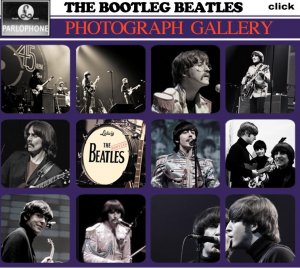 You were keeping their music alive maybe?
You were keeping their music alive maybe?
Not that they needed it, but I guess it all helps. But without sounding ingratiating we really do love this music and want to do it right so the audience can get that buzz.
You've been a Beatle now for about three times longer than they ever were.
Exactly, but I'm not a "former Bootleg Beatle" yet.
What kind of band would I have had to be in, and have how many hit records, to go around the world like this? It's been amazing, that link with Beatle history, and we've recorded in Abbey Road Studio Two several times.
I love the story and this has been a great chance to indulge in it.

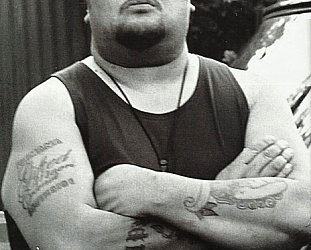
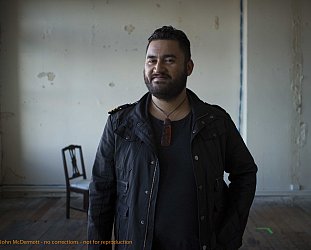
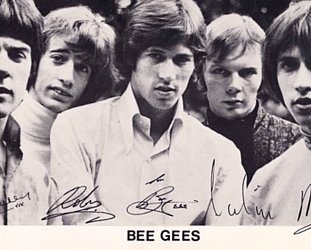
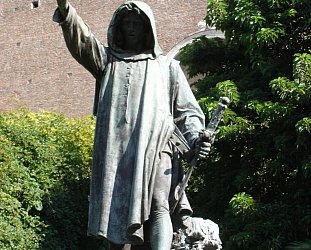
jeff - Sep 26, 2012
what a great interview and the insight into george and his genius song writing skill was very revealing of the person he was. I never did like the beatles back in the day and it has only been getting into georges solo stuff that I have worked backwards into the beatles catalogue. Having a 19 year old son who loves their music has helped. I now view them in a different light.
Savepost a comment